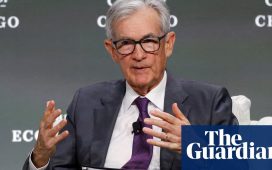Key events
Pharmacy services are expected to be “slower than usual” today as the recovery from the major global IT outage caused by the CrowdStrike update failures continues.
Nick Kaye, chairman of the National Pharmacy Association (NPA), said:
As pharmacists recover from last week’s IT outage and catch up on the backlog of prescriptions, we expect service in some community pharmacies to be slower than usual today.
Please be patient with your local pharmacy team if you are visiting them, as they may still be prioritising emergency prescriptions from their local GP surgeries as well as experiencing increased demand as services return to normal.
As ever, community pharmacies have worked hard to provide support for those who need them during this period.
Commenting on the global travel chaos caused by the CrowdStrike IT failures, Ryanair CEO Michael O’Leary said the airline had 400 cancellations this weekend, mainly due to the fallout from Friday’s IT issues.

Phillip Inman
The UK government will need to raise taxes, increase borrowing or make spending cuts unless it can grow the economy by at least three times this year’s expected rate, according to analysis by the International Monetary Fund.
Economic growth would need to be around 2.6% in each year of parliament from next April before Labour can claim to have stabilised the public finances.
That is well above the rate of growth predicted by the IMF.
Last month the IMF predicted the UK economy will grow by 0.9% in the current financial year, ending in April 2025. That is projected to rise to around 1.6% or 1.7% in the remaining years of this parliament.
The calculations showed that the UK budget balance excluding interest payments will need to improve by between 0.8 and 1.4 percentage points of GDP per year to get debt under control.
In analysis for the Financial Times (paywall), IMF staff estimates show the acceleration in economic growth needed to avoid tough choices will necessitate a return to the expansionary period seen before the financial crash of 2008.
A Treasury spokesperson told the FT that the government was “under no illusions” about the scale of the challenge facing the economy.
Delivering economic growth will require tough choices and difficult decisions.
That is why we have already started to take the action necessary to fix the foundations of our economy, so we can rebuild Britain and make every part of our country better off.
Ryanair CEO: Consumers resistant to price hikes
The Ryanair CEO Michael O’Leary has told analysts this morning that the airline is repeatedly seeing resistance from customers when they have tried to put up prices for flights.
And that is unlikely to change anytime soon, with O’Leary adding that the trend is ‘downwards, not upwards’ and that they see no reason why prices in Q3 and Q4 won’t be soft as well.
This could result in Ryanair boss said this could result in double digit percentage falls in fares, and that, at minimum, it could mean a 5% drop year-on-year in the second quarter.
But O’Leary speculated over whether this year could actually be part of a ‘rebalancing’ after double-digit fare increases in recent year.
He added that the airline will aggressively advertise the availability of low-price fares.
Begbies Traynor data also showed that around 40,613 UK businesses are in “critical” financial distress, up 1.1% on the prior quarter and 34.5% higher than a year earlier:
Top 10 Sector Ranking – Critical Financial Distress
-
Construction 6,043
-
Support Services 5,758
-
Real Estate & Property Services 5,575
-
General Retailers 3,113
-
Professional Services 2,770
-
Health & Education 2,436
-
Telecommunications & Information Technology 2,256
-
Food & Drug Retailers 1,696
-
Bars & Restaurants 1,587
-
Media 1,467
There are concerns concerns about the continued impact of high interest rates – for both consumers and businesses – even with the prospect of near-term rate cuts.
Palmer said:
Additionally, the situation for the consumer remains very precarious. The latest figures from the Bank of England highlights how more than three million households will come off their fixed rate mortgages over the next two years – resulting in substantially higher repayments for many – which will in turn act as a drag on disposable incomes.
In a climate like this one, many businesses who were supported through the pandemic and its aftershocks by the government, will be hugely concerned by the very real prospect of a prolonged period of higher interest rates.
Many businesses who loaded up on cheap debt prior to the pandemic are simply not equipped to survive the current pressures and the financial burdens they face may ultimately prove too much.
Data: 10% jump in UK businesses in ‘significant’ distress
The number of UK companies in “significant” financial distress jumped by nearly 10% in the second quarter, according to Begbies Traynor.
It comes as weak demand from cost-conscious consumers and more expensive debt repayments hit businesses.
Newly-released data from one of the UK’s biggest insolvency practitioners the number of businesses facing significant distress rose to 601,950 from 554,554 in the first quarter, with increases in 20 of 22 sectors.
The change was even more stark year-on-year, up 36.9% from the same period in 2023.
It reveals a particularly worrying picture of British corporate health, with a marked acceleration in leisure sectors quarter-on-quarter, including:
-
Travel & Tourism (+20.1%),
-
Hotels & Accommodation (+16.4%)
-
Bars & Restaurants (+12.2%)
Those business have been by weak confidence amongst consumers still struggling financially from the impacts of the cost of living crisis.
Julie Palmer, a partner at Begbies Traynor, said:
It looks like 2024 will prove to be another tough year for UK businesses. Six months in, and we’re seeing clear signs that financial distress is growing across almost every sector.
It is a particularly difficult situation for businesses in consumer facing sectors, such as hospitality. While a fall in inflation to more palatable levels will likely provide some relief, consumers simply aren’t behaving like they used to and these businesses, who are still grappling with higher costs pushed up by higher wages, are really struggling.
This, combined with one of the wettest summers on record, continues to significantly impact trading.

Mark Sweney
Full story: Ryanair has said its profits plunged by almost half between April and June and warned that fares this summer would be “materially lower” than last year.
Europe’s largest airline reported profits of €360m (£303m) in the spring quarter, 46% lower than the same period last year, despite passenger numbers rising 10% to 55.5 million.
The downbeat results, which missed analysts’ estimates, drove the budget carrier’s share price down 12.5% in early trading on Monday.
The news also affected other publicly traded airline stocks. EasyJet fell 7.5%, Wizz Air was down 6.3% and IAG, the owner of British Airways and Iberia, slipped 3.3%.
The average cost of a fare dropped from €49.07 to €41.93 year on year, but the increase in passenger numbers helped limit the decline in total revenues to 1% at €363bn.
Ryanair said while it expected strong demand this summer, with passenger numbers likely to be up 8% overall this financial year, “pricing remains softer than we expected”:
We now expect second-quarter fares [July to September] to be materially lower than last summer…The final first-half outcome is, however, totally dependent on close-in bookings and yields in August and September.
“Close-in bookings” refer to customers waiting much longer than usual to book summer flights.
Read more:
British online supermarket group Ocado is getting a boost, and is one of the biggest risers on the FTSE 250.
Shares were bolstered after US grocer Kroger placed an order for a wide range of new automated technologies to roll out in warehouses across its network.
While the company did not put a value on the Kroger order, it said it would be using the tech in both current and future warehouses, suggesting a boost to future revenues.
It comes a week after Ocado raised its annual guidance for its technology arm. The company said it expects its tech division to achieve a “mid-teens” Ebitda (earnings before interest, tax, depreciation and amortisation) margin this year, up from previous guidance of more than 10%.
CEO Tim Steiner said last week that the global shift to online shopping had resumed, after a brief post-pandemic pause: “We expect to see a lot of long-term growth.”
A view of those Ryanair shares, which are getting hammered after the airline’s earnings results:
Matt Britzman, a senior equity analyst at Hargreaves Lansdown says there will be knock-on effects to the wider sector, as investors speculate whether rivals are feeling similar pressures:
Ryanair disappoints as the outlook over the key summer period looks weak
First quarter profit after tax of €360mn was well below what markets expected as ticket prices plummeted.
The outlook was poor, too, with Ryanair expecting lower prices as peak summer travel kicks in.
There will be knock-on effects to the wider sector from this, though it’s a little unclear whether the likes of easyJet are facing issues at quite this scale.
Ryanair shares tumble 12.5% at start of trading
Disappointing Ryanair profits – and its warnings over depressed summer airfares – has knocked back its shares 12.5% at the start of trading.
The airline’s disappointing update has also managed to drag down rivals, including British Airways owners IAG, which is one of the biggest fallers on the FTSE 100 index, down 3.3% .
But even worse-hit is EasyJet which is down more than 7% and is now at the bottom of the bluechip index.
European stocks open higher, as traders poised for reaction on Biden drop out
All eyes are on market reaction to President Biden’s decision to pull out of the US election race. And we have positive prints from all major indexes at the start of the European trading day.
-
FTSE 100 is up 0.43%
-
Germany’s DAX is up 0.5%
-
France’s CAC 40 is up 0.5%
-
Spain’s IBEX is up 0.4%
-
Euro Stoxx 600 is up 0.3%
Introduction: CrowdStrike still working to restore services after IT meltdown
Good morning, and welcome to our rolling coverage of business, the financial markets and the world economy.
The world is still recovering from the global IT outage caused by a faulty security update by cybersecurity firm CrowdStrike last week, which hit hospitals, businesses, banks and airline services around the world.
In LinkedIn post overnight, CrowdStrike said it was continuing to “focus on restoring all systems as soon as possible,” and that it had deployed a “new technique” to try get everyone back online.:
CrowdStrike continues to focus on restoring all systems as soon as possible. Of the approximately 8.5 million Windows devices that were impacted, a significant number are back online and operational.
Together with customers, we tested a new technique to accelerate impacted system remediation. We’re in the process of operationalizing an opt-in to this technique. We’re making progress by the minute.
While the company has again apologised for the disruption, full restoration could take weeks. And that may result in further pain for CrowdStrike’s US-listed shares, which have so far plunged 11%.
Meanwhile, Ryanair has suffered a 46% drop in its first quarter profits, covering the three months to June, after the airline was hit by cost-conscious travellers.
Average passenger fares fell 15% in the quarter, compared to a year earlier, with CEO Michael O’Leary explaining that they had to take part in “more price stimulation than we had previously expected – meaning the the airline had to cut prices to bolster demand.”
He said the airline had recently tried to close off some cheap seats but they were met with resistance, and opened up lower-cost seats again, as a result.
O’Leary warned that there was likely to be more pain the second quarter:
While Q2 demand is strong, pricing remains softer than we expected, and we now expect Q2 fares to be materially lower than last summer.
The agenda







